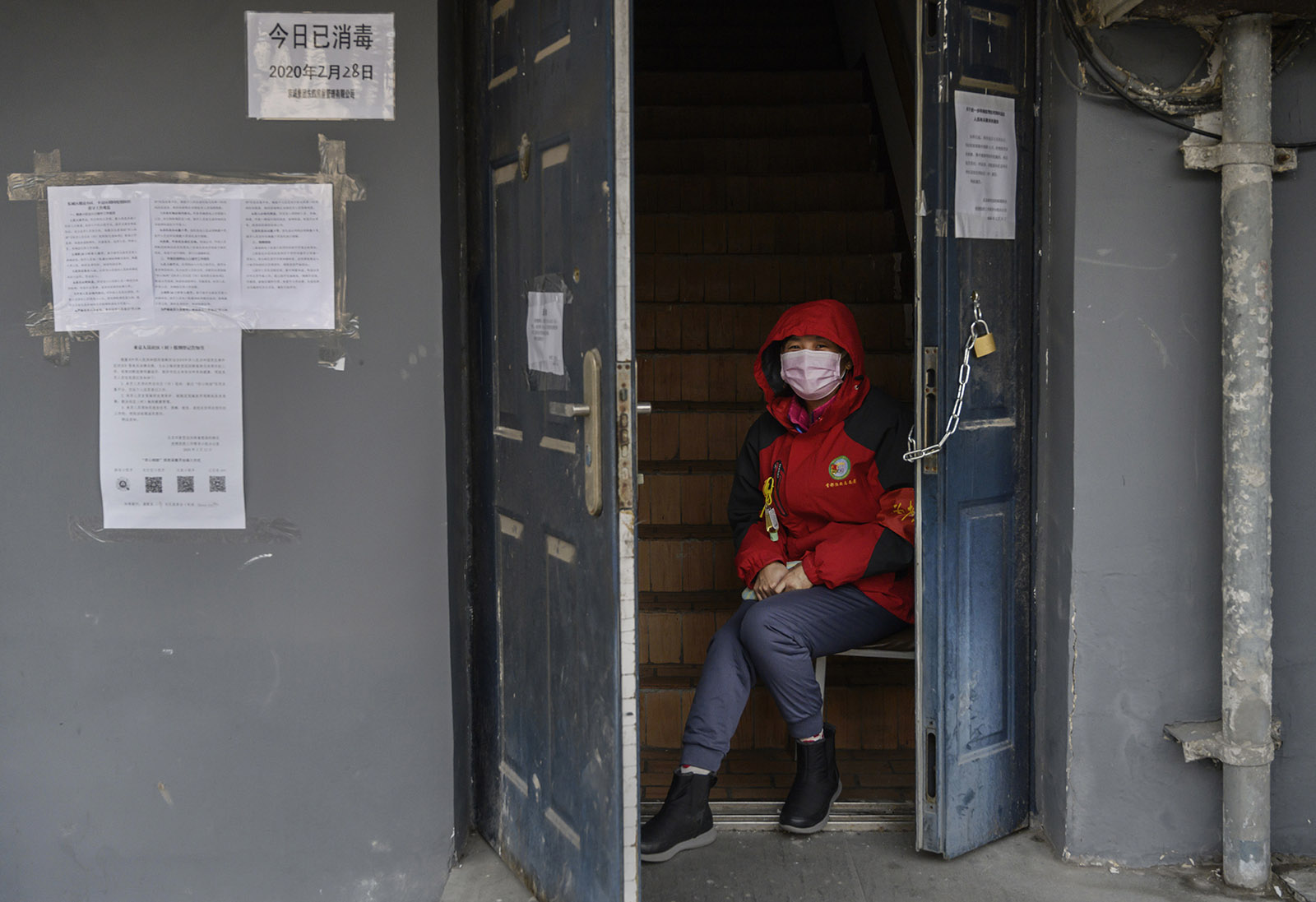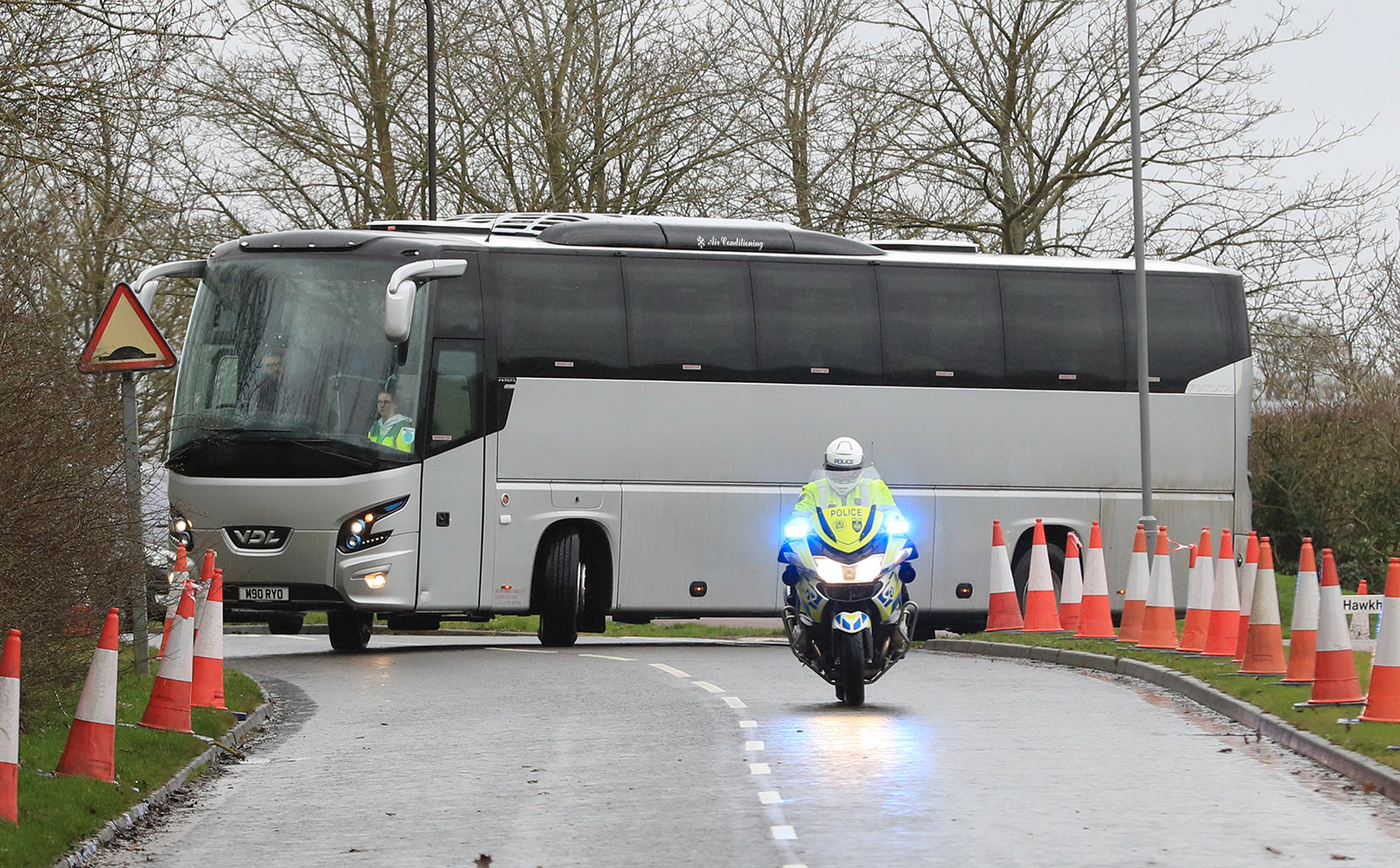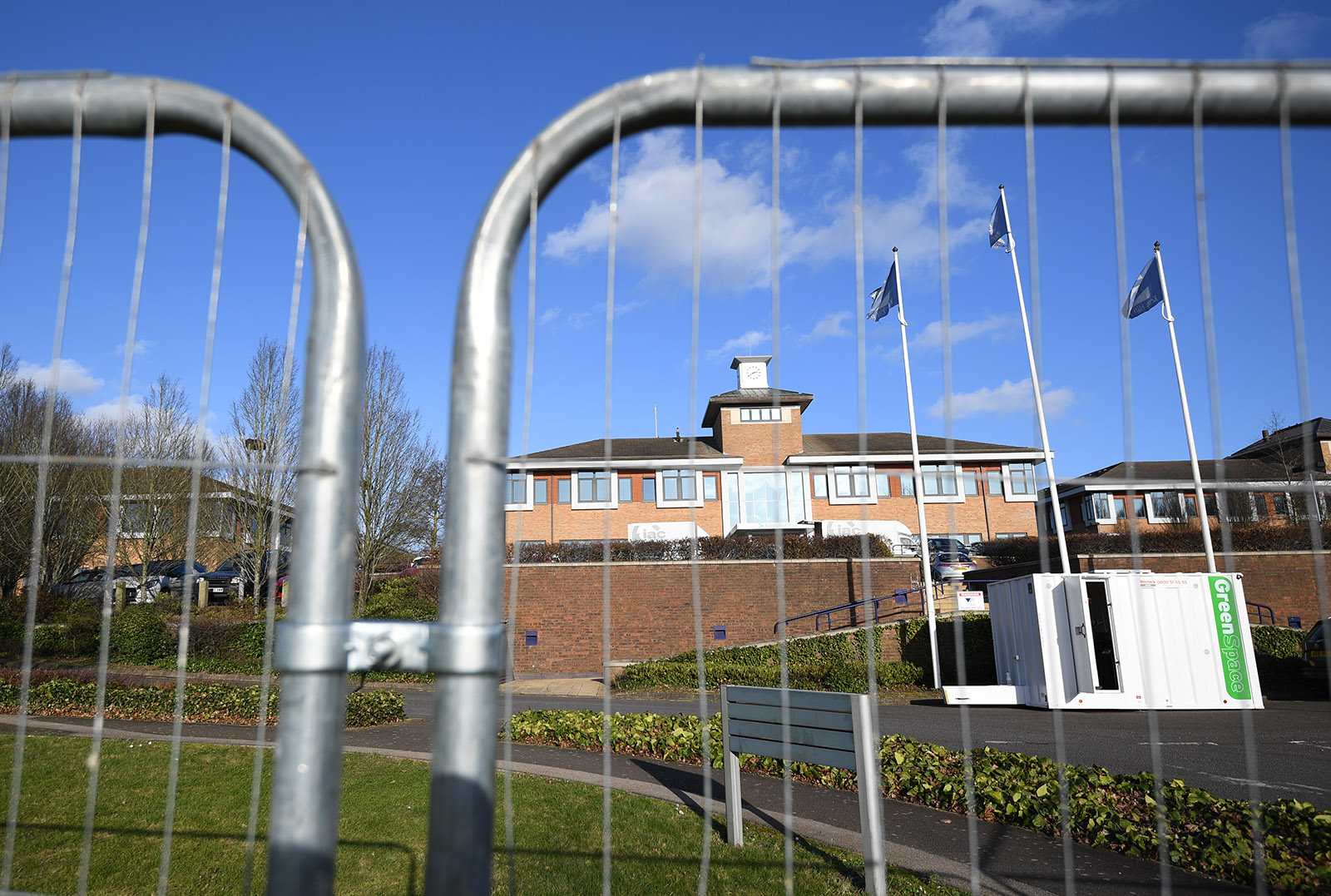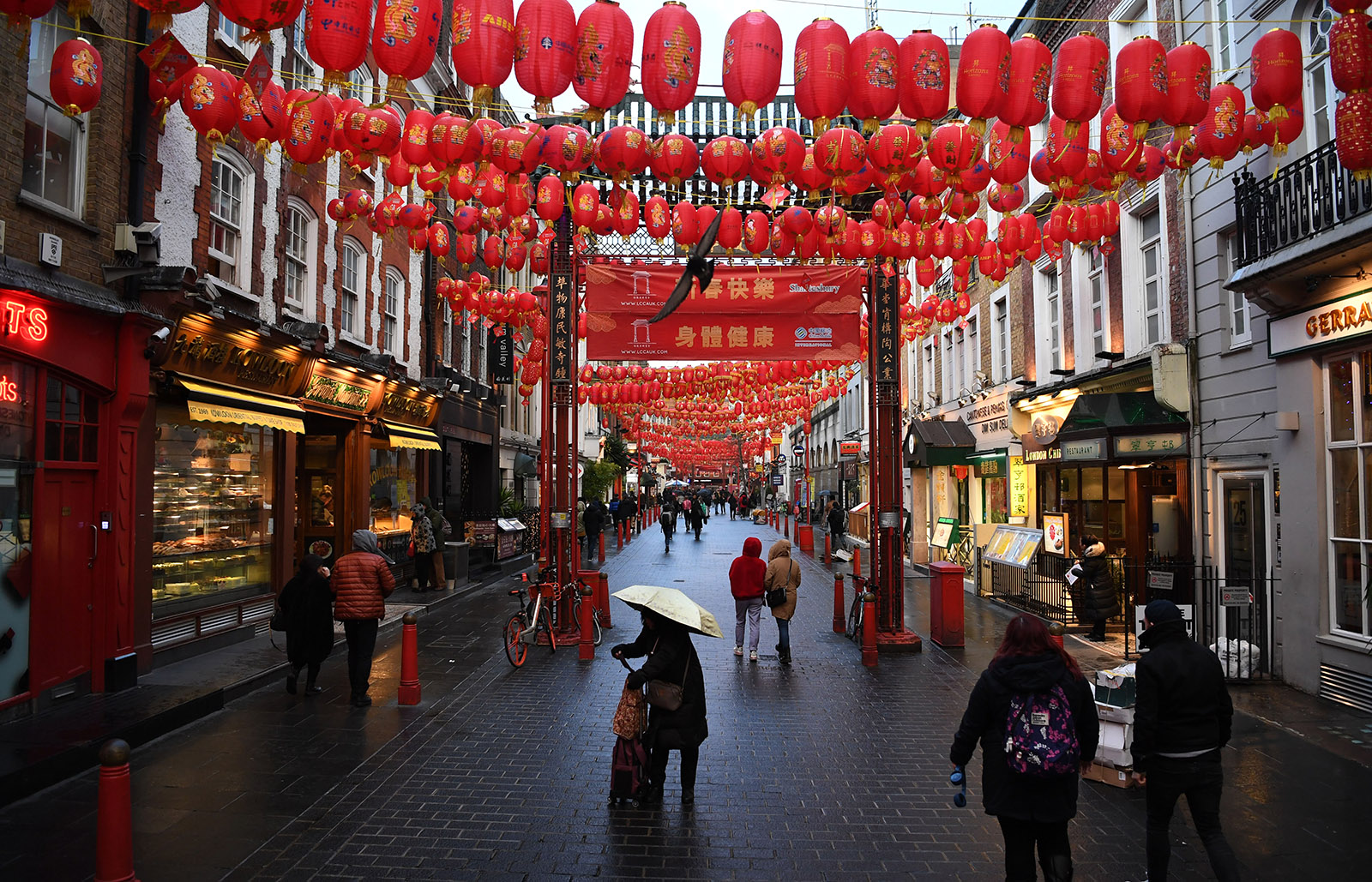I got a message in the back seat of a black sedan, a car that usually drives local officials: “It’s good you left. There’s a case on the seventeenth floor.” The sender was Ningning, whose family I had stayed with for over two weeks, and whom I had left, clutching a water bottle in hand, back at her family’s complex on Danjiang Road in Shiyan. Her uncle had procured the car for me to take me to Wuhan’s Tianhe airport. She messaged me two hours into my trip away from her, and from quarantine in Hubei province.
I had missed the first British evacuation when my embassy didn’t get me a permit for the checkpoints in time, but I was trying to make the second. My send-off gifts: two instant-noodle pots (hot food safer than cold), a tub of alcohol-soaked cotton balls for cleaning my hands, and tissues for pressing elevator buttons. Ningning had come downstairs to say goodbye and make a trip to the apartment compound’s water dispenser at the same time. She wasn’t allowed to leave the building for the next week.
Nearing the edge of Shiyan, I saw the salesrooms of the city’s main employers: Dongfeng, Citroen, Peugeot, Sinopec, Volvo, Haima, Audi. On the side of the highway was a piece of public art made of twisted thick wire. Only after passing it did I see it was a giant steering wheel. My driver, Mr. Wang, wore Michael Jackson-style gloves and a cap bearing block-lettered nonsensical English. He refused to speak to me for the whole drive. I had thought it would take seven hours, but five hours in, I asked if we were almost there. “Yes,” he replied.
We were stopped only once, I think, but I fell asleep, so I could have missed someone pointing an infrared thermometer at me at some point. At the checkpoint I was awake for, a nurse inspected my permit, checked my temperature, and then said, “Go quickly.”
“Hubei welcomes you,” a sign read, and on that long highway, I felt it did. Later, I heard of less hospitable treatment, of service stations refusing fuel, of police officers laughing at someone else’s permit because its first page was missing the red seal that invests all official documents in China with power.
We stopped at a service station where there were old truck drivers, their vehicles festooned with red banners: “All-out war against the virus, weather hard times together.” The drivers wore their masks down around their chins as they smoked. I asked for water at the only open shop, and the assistant pulled his jacket up to cover his mouth before saying “over there.”
In the days leading up to evacuation, we had begun living a life of guesswork. A thumping noise had started from the flat upstairs. Ningning thought it was a student starting exercise classes online. An email from Ningning’s university told her not to worry about return tickets: she was banned from Beijing until their say-so.
The day I left, I found paper flyers stuck on the walls of the apartment building. Some were pink, others white. One was “a letter to old friends,” with twelve tips, one advising “do not not care, do not be over-scared.” It seemed easier to go to the gate and chat to the guard about what was allowed than to read them all. Up until my leaving, exiting the compound was a case of writing down your name, ID number, and apartment number, and listening to the guard advise you not to go out, even if you were out of vegetables, and instead join the WeChat-powered grocery shopping group.
At the airport, there was only one way in as most of the doors were locked. The check-in involved filling out three forms calling for various declarations. There were cases in my neighborhood (as of that morning). I had not had direct contact with confirmed cases or suspected cases of the novel coronavirus-related pneumonia. I had not disposed of, eaten, or been otherwise exposed to wild animals or animals from an unknown source. I was not engaged in animal husbandry, slaughter, capture, or specimen production. I left “places traveled during the past fourteen days” blank. I took my forms and followed the queue, passing through a scanner that checked my temperature.
A clerk manually wrote my temperature on one of the forms: 36.5 degrees Celsius (97.7 degrees Fahrenheit). He looked through the rest of the forms, then waved me, not ahead to my flight gate, but to another line heading into a partitioned space. Everyone there was wearing white hazmat suits, face shields with “direct splash protection” written on them, and blue hair and shoe covers. One man, in a yellow hazmat suit, held passports and forms in his right hand, seated, not apparently having any other purpose.
Advertisement
I was directed into this line because I’d ticked “yes” for cases in my neighborhood. A man who had also been pointed this way loudly announced, “I’ll take one for the team and be tested first,” then walked ahead, thinking he’d be up next. We both waited fifteen minutes.
I texted a friend at the British embassy, who told me to get a move on. A nurse gave me a thermometer. “Two people have been refused already,” my embassy friend added. I was told there were more tests to come.
“I suggest you don’t fail it,” texted my friend. “They’ll make you make your own way back to Shiyan if you do so.”
“Got a thermometer in my armpit. Nervous. Does that raise temperature?”
“Yes,” he replied. “Keep calm.”
The thermometer read a tenth of a degree hotter than the scanner. A doctor approached, holding my forms. He projected irritation through his mask and goggles. His hazmat suit had the Chinese equivalent of “You go, you!” written on it. He reeled off the tests I was supposed to do. There were a lot.
“Doesn’t that sound annoying?” he asked. “Well, it’s annoying for us, too.” He gave me a new form. “Fill it out again.”
I took it and, as he advised, box-ticked my way through to the gate.
There, we were separated by nationality into three aisles on the plane. Toilets were labelled UK, Germany, and Italy to prevent any cross-contamination by national group.
*
Some twenty-four hours later, we arrived to a shaky landing at Brize Norton, a military airport in the UK. People unbuckled their seatbelts and stood up. “There is a cross-contamination risk if you stay standing. It is important that you sit down,” said the flight attendant in hazmat suit, goggles, and hair cover.
When I stepped out of the plane, my mask almost blew off. With one hand clamped to my face, I made my way down the stairs into the waiting coaches. Storm Ciara was hitting. “Worst it’s been for the past thirty years or something stupid,” said the coach driver. Tape cordoned off the front half of the coach’s seats so we wouldn’t sit close to him. He drove us to Kents Hill Park Training and Conference Centre, where we were to be quarantined for the next two weeks, an hour’s drive from where my parents live in London. I had found out where we were staying from national news.
Our group of about a hundred or so were placed first in a meeting room. I wrote my name on four labels for the swabs the staff would take. In China, before the evacuation, I was case 21697. Now, in the UK, I was MK81.
One swab up a nostril, another to the back of the throat. Each twice. Afterwards, I went to “the shop,” which stocked free soap, tissues, baby food, and basic clothes from Primark (the UK equivalent of Target). I was one of the last to get there, along with a bespectacled man, so the stuff had already been well-picked through. “I can wear women’s clothes,” he said, cooperatively.
The first forty-eight hours, until the results of the first swab came back, were spent inside our own rooms. They were designed for a conference attendee, with a desk large enough for a laptop, a wooden box for tea, and by the window, a ledge for a carry-on suitcase. If the tests were negative, we could move around the building, but had to wear masks and gloves at all times.
“Much as we love you, we hope you are only here for two weeks,” a manager told us.
We all tested negative. There was a meeting in the courtyard, which our buildings surrounded. I spotted three babies, one dressed in a romper decorated with green moons, another in gray-black spots, and the third in an Edwardian-collared red jumpsuit. The manager told us to keep two meters (six feet) apart from one another, which was not actually possible in the available space. He wanted to make us as comfortable as possible, he said, though he was more accustomed to running hospitals than hotels.
A guest requested a hot plate. “I can hear health and safety on my shoulder,” the manager said. He promised the catering would improve. Another guest asked for sports equipment. Later, I saw new courtyard additions. Goal posts for soccer, a basketball net, two child-size trampolines, and ashtrays.
Security guards sealed the windows in the corridor that ran along the outside of the building to the courtyard with paper and masking tape to provide privacy from the press. We were given numbers for advice on how to deal with media requests, for the local Samaritans, for counseling.
Each day, we got at least three knocks on our doors. A volunteer in a plastic apron, latex gloves, and mask passed over a tray each time, along with an endearment like “darling,” “my dear,” or “lovely.” On it were meals in plastic cartons, which we could warm up in the microwave that was in each room, and a “Newsletter for Guests,” which expanded according to the number of queries.
The other main form of communication was the notices that began to appear on people’s doors by the end of the first week. Hot meals for dinner, please. Do you want to be woken up for breakfast? No. Vegetarian, no cake. Please knock on door and leave by door. Teaching online; please do not disturb. Important: diabetic meals only. Baby sleeping, no knocking. Beef curry for lunch, every day. Prefer all food is covered/in box or plastic/do not open to air.
The menu choices expanded to more than twenty within the first week. When it came to breakfasts, quarantine took me back to a childhood cocoon of Rice Krispies, Frosties, Crunchy Nut, and Coco Pops. The meals were usually of inverted textures, the unhappy result of using microwaves to cook British classics. The batter on a fish and chips was soft, while the potato chunks constituting hash browns were hard. I suspected that someone had made a complaint: “cottage pie—improved” appeared on the menu four days in.
When our first cooked meal was announced at the start of our second week in quarantine, I talked about the addition of a twenty-eight-ounce ribeye steak a lot. It ran out. Later, I heard I wasn’t the only one to go without, and that another guest had thrown his replacement food at the staff. I agreed with another guest, a mother-of-one, on how terrible his behavior was, but we also wondered if he had cabin fever. I never saw the meal-thrower leave his room.
One of the first times I went out to the courtyard, I saw a man playing soccer by himself. A mother lifted her small child, in simulated jumps, on one of the two trampolines. Volunteers cleared beer bottles and cigarette ends from the ashtrays. Later, I saw a woman practicing a traditional Chinese dance, holding an invisible fan. An old man in a red sweater left his room to walk around in circles in the corridor area just outside. Each circle was ten steps.
The only people whose full faces I saw, were those who pulled their masks down to smoke. One was without a glove. He joked he was saving the National Health Service money by keeping one hand in his pocket. In fact, the nurse who’d taken my second swab wore three layers of gloves: a short pair, a long pair masking-taped to her sleeves, and a fresh pair she changed for each patient. It was also in the smokers’ corner that I learned we were each allowed a maximum of five mini-bottles of wine a day.
*
Placing a call back to Ningning in Hubei, I heard how the neighborhood committee, the Party’s grassroots unit in cities like Shiyan, had given the family three cabbages as a goodwill gesture. Ningning had begun taking her temperature every day and reporting the result to the neighborhood committee. Her fourteen-year-old cousin Feifan was now living with her grandmother, as his parents, who work in the hospital, were worried about their exposure putting him at risk. Ningning’s mother was considering becoming a volunteer herself, buying groceries for people who, including her, are not supposed to leave the house. “To serve others,” she said. There’s an age limit of forty-five for volunteers, which she exceeded, but she knew the committee members.
Blue tents had appeared within the apartment compound, Ningning also reported. They were for the grocery-delivering volunteers, one assigned to each building, to rest in. The day I called, they had brought chocolate-chip cookies and sunflower seeds.
The residents of her compound had started a 500-strong WeChat group. Inside, the neighborhood committee representative announced they had bought locks to stop people leaving their buildings. The day before some locals had argued their way past the volunteer who was manning the main gate. The committee wanted residents to do all their grocery shopping on the local “New Cooperation” WeChat app. Ningning said it had become a case not of choosing what to buy, but of buying whatever they had.
The neighborhood committees had become the arbiters of life under quarantine in Shiyan and beyond. A doctor friend told me that some people were imprisoned for challenging community rules, beating the guards, or even trying to break down gates with their cars. The doctor herself had wanted to visit her elderly father, who lived on Chongming Island, but the local neighborhood committee told her she’d have to be quarantined there for fourteen days, even though she was living in the same city. The neighborhood committee was making up rules. She threatened to post about this online.
They settled the matter through a form in which she declared herself healthy. She was washing her hands up to forty times a day, as it was—it made her understand, she said, what having obsessive-compulsive disorder might feel like.
*
Covid-19 is imagined in the media, and in some people’s minds, as a disease that comes from meat hung outside, from exotic animals caged, from people willing to eat things that they shouldn’t. Never mind that the original vector is still unclear. Becoming infected, goes the thinking, is therefore a decision—if not of the individual, then of the system that allowed it to happen. Some kinds of criticism become a way of affirming a superior civilization, from a far-away land where epidemics could never happen.
Covid-19 has thus mutated into a matter of image and character. The Chinese face has become a way of wearing disease.
My mother does not talk about racism. I asked her about it once and she said, yes, she’d experienced it. I asked her what they said. “They don’t have to call you a Chink to know it’s racist.” When I was still in Shiyan, she had another such moment in London. No words, just a guy circling my mother threatening to spit on her.
“I deplore any attacks on the Chinese community. This is not about one part of the world,” said the UK government’s health secretary. And that was as far as he went to call out the racist and the misinformed.
China’s propaganda effort has been more persuasive, and members of the Chinese diaspora like my mother were the most moved by it. She forwarded me a video in which an anchor for the state broadcaster China Global Television Network spoke eloquently about how wrong and insensitive it was to equate the virus with Chinese nationality or race. I recognized this anchor from a visit she made to Hong Kong, where she shamed a security guard on Twitter for his inability to speak Mandarin, even though Cantonese is the main language.
My mother later sent me another two videos, both set to similarly triumphal violin music. In one was a white Canadian man who enunciated every word, “If only we could trade this racism and hatred for compassion, the world would be a much brighter place.” The other was of the World Health Organization head praising China’s efforts. Both had simplified-Chinese subtitles.
A grandmother stuck in quarantine with me spoke about attacks she’d seen on the news. “If these kinds of things keep happening, we Chinese people must think of something,” she said. Her daughter had got out on the first evacuation flight, when it was still unclear whether Chinese nationals like her, the mother, could board. She told me she was having trouble with the British food but was a fan of the apples. She ate five a day. Before she left, she had bought an automatic watering contraption for her plants, but wasn’t sure it was working. She had fish, too, and showed me a photo of them, taken before she left. She held little hope they would still be alive.
She planned to return to Wuhan once the virus passed. As our quarantine period came to an end, others were leaving for Grantham, Sheffield, Lancaster, London. For one, I heard, the first stop after leaving was going to be for barbecue. For another, walking their bulldog terrier, named Dana.
We were separated into groups, red, blue, green, yellow. I was with the reds, people who would be picked up. My parents came to collect me.
Our first stop was a dim sum restaurant in North London called the Golden Dragon. The egg tarts still had layers of puff pastry that flaked off, the cheung fun thin and smooth. There are more daikon slices in the luo bak goh than last time, said my mother. The manager said that lunch footfall there had fallen by 30 percent, and now one person does what used to be two people’s jobs.
I heard about how some had been sent to a sanatorium of aggressions: a teenaged Chinese boy sat next to empty seats on the London Underground; a Thai man gingerly touched the nose job he’d had to get, following an assault; a schoolmate, ethnically Chinese, verbally abused; her friend who defended her, punched and concussed. And then how some, panicked like a waitress who ran into a restaurant shouting, “Chinatown is quarantined!” I heard that people who look Asian worry about coughing on mass transit.
When I left quarantine, another layer of isolation was underway in this country. This, when the number of people testing positive for Covid-19 had reached thirteen.





